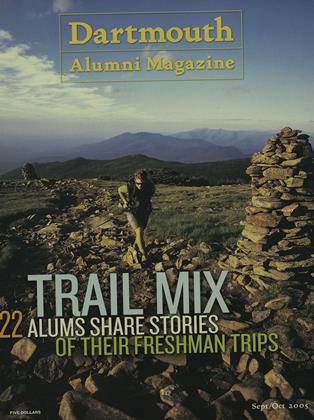Carol Muller ’77
On nurturing female scientists and engineers
Sept/Oct 2005 Lisa FurlongOn nurturing female scientists and engineers
Sept/Oct 2005 Lisa FurlongOn nurturing female scientists and engineers
"I'm a firm believer in a liberalarts education. We draw on the liberal arts in our daily lives, our work, our decisions as citizens in society. There is value in common learning that allows you to blend with your cohorts and peers."
"When I was a student, if youwanted to kayak you built yourown, with molds created by Ledyard members, sheets of fiberglass, resin and with peer instruction and teamwork."
"[Harvard President] LarrySummers did us all a big favor. When he raised questions about whether or not even the most dedicated women have what it takes to compete and be successful in scientific fields, he created an opportunity for discussion that needed to happen."
"The experience of women in science has had a lot to do withinstitutional hurdles, climate issues and micro-inequities. All those tiny, tiny slights and biases add up and do create a barrier. Many women have turned away from science without suggesting they encountered chilly climates because they wouldn't even discern them as existing."
"If you're working 60 to 80 hours a week youshould be doing it because you love it, not because someone is putting up an artificial bar. Too many American institutions consider primarily quantitative measures of a persons work rather than the quality, even when quality is what they want to measure."
"When I look at the status of women in scienceand engineering today I'm encouraged. Women and men continue to have very distinct roles in our society. But 35 years ago fewer than 1 percent of students in engineering were women; now its 20 percent—double what it was 15 years ago."
"It's interesting to see women in their 30s who now realizeit's hard to have it all. The No. 1 thing that makes it possible to balance career and family is the right partner. Then you have to incorporate other people into your life. It does take a village."
"We should encourage kids' natural curiosity about how thingswork and why the sky is blue. They need to know there are ways to find the answers."
"Many of the sciences have promoted the belief that they areonly for the best and the brightest, leading lots of people tothink it's inevitable a lot of students won't do well. Expectations can really affect performance—not just test results but understanding material. This has nothing to do with raw intelligence."
"We need to be as concerned about math literacy as we areabout reading. If we believed everyone could learn physics and calculus at least to a certain level then we'd have to be worried when people didn't."
"Most elementary school teachers have experienced a higher education that doesn't require very much math and science. The [teaching] profession also attracts some people who fear those subjects. That's one reason kids aren't as apt to get excited about math and science themselves."
"After a student trip to IBM, I thought about e-mail as a wayto bring undergraduates and professionals together despitedifferent schedules. When I explained my idea to Amy Muller '78 (no relation), who also worked with WISP, she immediately said, 'Oh, right: e-mentoring.' She coined the phrase."
"People should have multiple mentors. It's unlikely that one person could mentor another in all aspects. More than half the women in Mentor Net say a female mentor isn't a requirement for them, which might be why a growing number of men are volunteering to be mentors.Typically, women want to know what it's like working out there in the real world."
"When I was an undergrad President JohnKemeny advised us to 'bewareof simple solutions to complex problems.' That advice still resonates strongly with me as I navigate educational organizations and policy and organizational change."
CAREER: Founder and CEO, Mentor Net, which has electronically matched more than 13,000 female students with professionals in scientific fields, San Jose, California, 1997-present; consulting associate professor of engineering Stanford University, 1998- present; co-founder, Women in Science Project (WISP), while assistant then associate dean, Thayer School, 1987-1996 NOTABLE ACHIEVEMENTS: Recipient of numerous awards for WISP and Mentor Net EDUCATION: A.B., philosophy, magna cum laude; master's (1981) and Ph.D. (1985), education administration ministration and policy analysis, Stanford University; management development program, Harvard (1990) FAMILY: Husband Al Henning '77, children Kaethe '06 and Scott '09
 View Full Issue
View Full Issue
More From This Issue
-
 Cover Story
Cover StoryVoices Crying (and Laughing) in the Wilderness
September | October 2005 By BRYANT URSTADT ’91 -
 Feature
FeatureSex, Lies... and a Pulitzer Prize
September | October 2005 By DAVID MCKAY WILSON -
 Feature
FeatureSoviet Union
September | October 2005 By ROBERT SULLIVAN ’75 -
 PERSONAL HISTORY
PERSONAL HISTORYBand of Sisters
September | October 2005 By Maura Kelly ’96 -
 TRIBUTE
TRIBUTENo Quieter Bed
September | October 2005 By James Zug ’91 -
 Interview
InterviewThe Archivist
September | October 2005 By Sue DuBois ’05
Lisa Furlong
-
 Continuing Education
Continuing EducationLINDA VINCENT SPENCER '78
Sept/Oct 2002 By Lisa Furlong -
 CONTINUING ED
CONTINUING EDLouise Erdrich ’76
July/Aug 2009 By Lisa Furlong -
 INTERVIEW
INTERVIEW“Fat Don’t Fly”
Jan/Feb 2010 By LISA FURLONG -
 CONTINUING ED
CONTINUING EDDavid Shribman ’76
SEPTEMBER | OCTOBER 2018 By LISA FURLONG -
 CONTINUING ED
CONTINUING EDSharon Washington ’81
MAY | JUNE 2019 By LISA FURLONG -
 CONTINUING ED
CONTINUING EDSusan Dentzer ’77, Adv’22
MARCH | APRIL 2022 By LISA FURLONG
Continuing Ed
-
 Continuing Ed
Continuing EdVictoria “Tory” Rogers ’83
Jan/Feb 2012 By Lisa Furlong -
 CONTINUING ED
CONTINUING EDDavid Shribman ’76
SEPTEMBER | OCTOBER 2018 By LISA FURLONG -
 CONTINUING ED
CONTINUING EDCal Newport ’04
JULY | AUGUST 2021 By LISA FURLONG -
 CONTINUING ED
CONTINUING EDSteve Kelley ’81
JULY | AUGUST 2023 By LISA FURLONG -
 CONTINUING ED
CONTINUING EDAlison Fragale ’97
NOVEMBER | DECEMBER 2024 By Lisa Furlong -
 Continuing Education
Continuing EducationKaren Francis '84
Sept/Oct 2001 By Sean Plottner

